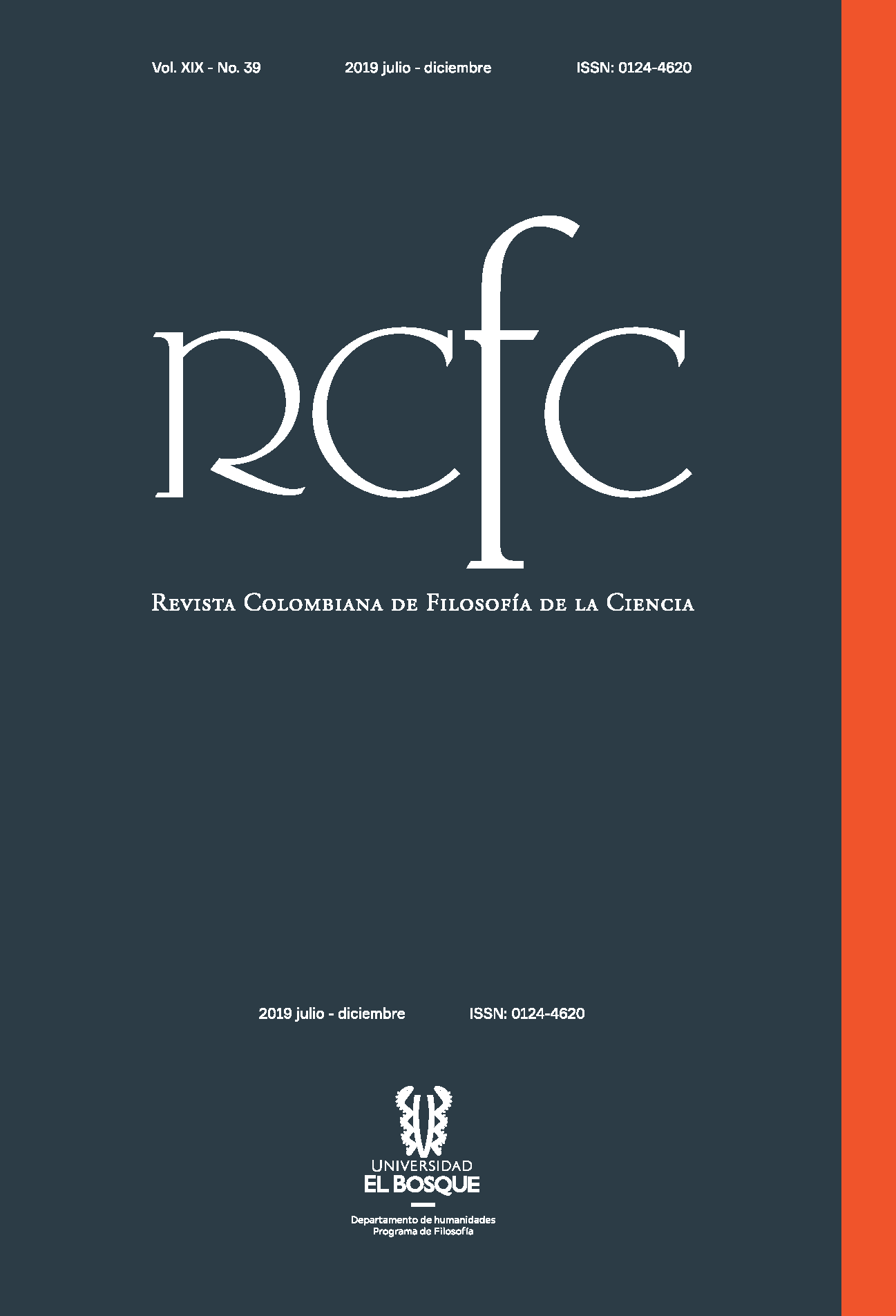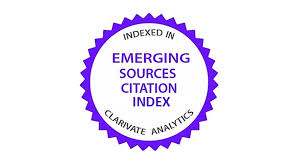Personal Identity and Science
The genetic approach regarding the case of appropriated children during the Argentinian dictatorship 1976-1983
DOI:
https://doi.org/10.18270/rcfc.v19i39.3027Keywords:
personal identity, genetics, appropriation of children, Argentinian dictatorship (1976-1983), pluralistic perspectiveAbstract
The philosophical problem of personal identity –the issue of finding the necessary and sufficient conditions for a past or future being to be a certain present being– has been treated by analytical metaphysics mostly. In this framework, plenty of references to thought experiments can be found, but they exhibit no connection to practical problems and scientific outcomes. Our purpose is to involve philosophy of science in that debate, since a genetic approach regarding identity can be considered supported by contemporary scientific knowledge. In order to do that, we will focus on the Argentinian case of the approximately 500 children who were appropriated during the most recent dictatorship (1976-1983). The appropriations deprived them, precisely, of their identities, but some of them managed to be recovered thanks to Abuelas de Plaza de Mayo (apm) and genetics. Our final purpose is to argue that a pluralistic perspective in philosophy of science, according to which values contribute to the very constitution of ontology science aims to describe and explain, will allow us to defend apm strategy but reject, at the same time, a reductive conception of identity.
Downloads
References
______. Las Abuelas y la genética. El aporte de la ciencia en la búsqueda de los chicos desaparecidos. Buenos Aires: Abuelas de Plaza de Mayo, 2008
Agamben, Giorgio. “Identidad sin persona”. Desnudez. Buenos Aires: Adriana Hidalgo, 2011. 67–78.
Bergel, Salvador. “El vínculo de la genética con los derechos humanos”. Genética y derechos humanos Encuentros y desencuentros. Ed. Víctor Penchaszadeh. Buenos Aires: Paidós, 2012. 41-67.
Bruebaker, Rogers y Frederik Cooper. “Beyond ‘identity’”. Theory and Society 29.1 (2000): 1-47. <www.jstor.org/stable/3108478>
Carnap, Rudolf. “Empiricism, Semantics and Ontology” Reprinted in the Supplement to Meaning and Necessity: A Study in Semantics and Modal Logic. Chicago: University of Chicago Press, 1956.
Cartwright, Nancy. The Dappled World: A Study of the Boundaries of Science. Cambridge: Cambridge University Press, 1999.
Chang, Hasok. Inventing Temperature: Measurement and Scientific Progress. New York: Oxford University Press, 2004.
_______. Is water H2O? Evidence, Realism and Pluralism. Dordrecht: Springer, 2012.
Córdoba, Mariana. “Entre la esencia y la ausencia de la identidad personal. La obsesión por las determinaciones únicas”. Fronteras del determinismo científico. Filosofía y ciencias en diálogo. Eds. Claudia Vanney y Olimpia Lombardi. Madrid: Biblioteca Nueva, 2015. 201–212.
_______. “Identidad personal”. Diccionario Interdisciplinar Austral. Eds. Claudia E. Vanney, Ignacio Silva y Juan F. Franck. 2017. <http://dia.austral.edu.ar/Identidad_personal>.
Córdoba, Mariana y Paula Lipko. “Identidad personal y genética: reflexión sobre la cristalización de una estrategia”. Revista Sophia: Colección de Filosofía de la Educación: 1.15 (2013): 267–287. <https://doi.org/10.17163/soph.n15.2013.11>.
Elliot, Kevin. “Direct and Indirect Roles for Values in Science”. Philosophy of Science 78.2 (2011): 303–324.
Fox Keller, Evelyn. The Century of the Gene. London: Harvard University Press, 2000.
Gatti, Gabriel. El detenido-desaparecido. Narrativas posibles para una catástrofe de la identidad. Montevideo: Trilce, 2008.
_______. “Imposing Identity Against Social Catastrophes. The Strategies of (Re)Generation of Meaning of the Abuelas de Plaza de Mayo”. Bulletin of Latin American Research 31.3 (2012): 352–365.
Giddens, Anthony. Modernidade e identidade. Rio de Janeiro: Jorge Zahar Editor, 2002.
Griffiths, Paul y Karola Stotz. Genetics and Philosophy: an Introduction. New York: Cambridge University Press, 2013.
Hume, David. [1739]. A Treatise of Human Nature. Ed. L. A. Selby-Bigge. 2nd ed. revised by P. H. Nidditch. Oxford: Clarendon Press, 1975.
Jenkins, Richard. Social identity. London: Routledge, 2004.
Johnston, Mark. “Human Beings Revisited: My Body is not an Animal”. Oxford Studies in Metaphysics 3. Ed. D. Zimmerman. Oxford: Oxford University Press, 2007.
Jong, Lisette, y Amade M’charek. “The High-profile Case as ‘Fire Object’: Following the Marianne Vaatstra Murder Case through the Media”. Crime, Media, Culture 14.3 (2018): 347–63. <https://doi.org/10.1177/1741659017718036>.
Lewontin, Richard., Steven Rose y Leon Kamin. Not in Our Genes: Biology, Ideology and Human Nature. London: Penguin Books, 1990.
Locke, J. [1690] An Essay Concerning Human Understanding, London: Penguin Books, 1997.
Lombardi, Olimpia y Ana Rosa Pérez Ransanz. Los Múltiples Mundos de la Ciencia. Un Realismo Pluralista y su Aplicación a la Filosofía de la Física. México: Siglo XXI, 2012.
Longino, Helen. “The Social Dimensions of Scientific Knowledge”. The Stanford Encyclopedia of Philosophy. Ed. Edward N. Zalta. Spring: 2016 Edition. <https://plato.stanford.edu/archives/spr2016/entries/scientific-knowledge-social/>.
Mackie, David. “Personal Identity and Dead People”. Philosophical Studies 95.1 (1999): 219–242.
M’charek, Amade. “Silent Witness, Articulate Collectives: DNA Evidence and the Inference of Visible Traits”. Bioethics 22.9 (2008): 519–528.
M'charek, Amade. “Fragile differences, relational effects: Stories about the materiality of race and sex”. European Journal of Women's Studies 17.4 (2010): 307 –322.
Mitchell, Sandra. Biological Complexity and Integrative Pluralism. Cambridge: Cambridge University Press, 2003.
Noonan, Harold. “Animalism versus Lockeanism: A Current Controversy”. The Philosophical Quarterly 48.1 (1998): 302–318.
Noonan, Harold. Personal Identity. 2nd edicción. London: Routledge, 2003.
Noonan, Harold y Ben Curtis. “Identity”. The Stanford Encyclopedia of Philosophy (Summer 2018 Edition). Ed. Edward N. Zalta. 2018. <https://plato.stanford.edu/archives/sum2018/entries/identity/>.
Olarte-Sierra, María Fernanda y Jaime Enrique Castro Bermúdez. “Notas forenses: conocimiento que materializa a los cuerpos del enemigo en fosas paramilitares y falsos positivos”. Antípoda. Revista de Antropología y Arqueología 34.1 (2019): 119–140. <https://doi.org/10.7440/antipoda34.2019.06>.
Olarte-Sierra, María Fernanda et ál. “Verdad e incertidumbre en el marco del conflicto en Colombia: una mirada a los sistemas de información como prácticas de memoria”. Universitas Humanística 79.1 (2014): 233–254. <https://doi.org/10.11144/Javeriana.UH79.vimc>.
Olson, Eric. The Human Animal: Personal Identity without Psychology. New York: Oxford University Press, 1997.
_______. “Personal Identity”. The Stanford Encyclopedia of Philosophy (Fall 2019 Edition). Ed. Edward N. Zalta. 2019. <https://plato.stanford.edu/archives/fall2019/entries/identity-personal/>.
Parfit, Derek. Reasons and Persons. Oxford: Oxford University Press, 1984.
Penchaszadeh, Victor. “Uso de la identificación genética en la reparación de la violación del derecho a la identidad durante la dictadura militar argentina”. Genética y derechos humanos Encuentros y desencuentros. Ed. Víctor Penchaszadeh. Buenos Aires: Paidós, 2012.
Penelhum, Terence. Survival and Disembodied Existence. London: Routledge, 1970.
Perry, John. “The Problem of Personal Identity”. Personal Identity. Segunda Edición. Ed. John Perry. Berkeley: University of California Press, 2008.
Putnam, Hillary. Reason, Truth and History. Cambridge: Cambridge University Press, 1981.
Quintana, María Marta. “Sobredeterminación y subversiones discursivas: el proceso de subjetivación política de Abuelas de Plaza de Mayo y las derivas de ‘la sangre”. El pensamiento en la Argentina Contemporánea. Tomo III. Derechos humanos, resistencia, emancipación (1960-2015). Eds. H. Biagini y G. Oviedo. Buenos Aires: Biblos, 2016. 333–350
_______. “Ni subversivos ni abandonados: botín de guerra. Disputas, inversiones y desplazamientos en el primer texto de Abuelas de Plaza de Mayo”. Tabula Rasa Revista de humanidades 26.1 (2017): 287-309. <https://doi.org/10.25058/20112742.198>.
_______. “Discursos disciplinares y construcción de saberes científicos en torno de la apropiación/restitución de niños en Argentina. Un abordaje de Identidad, despojo y restitución de Abuelas de Plaza de Mayo”. Sociedad y discurso 32.1 (2018): 127-149. <https://doi.org/10.5278/ojs.s%20&%20d.v0i32.2285>.
Regueiro, Sabina. “Análisis genético para la identificación de niños apropiados: construcción política y científica de la ‘naturaleza’ y el parentesco”. Estudos Feministas 18.1 (2010): 11–32. <https://doi.org/10.1590/S0104-026X2010000100002>.
_______. Apropiación de niños, familias, justicia. Rosario: Prohistoria, 2013.
Ricoeur, Paul. Soi-même comme un autre. París: Du Seuil, 1990.
Rosenberg, Alexander. “Reductionism Redux: Computing the Embryo”. Biology and Philosophy 12.4 (1997): 445–470.
_______. Darwinian Reductionism: Or, How to Stop Worrying and Love Molecular Biology. Chicago: University of Chicago Press, 2006.
Shoemaker, David. “Personal Identity and Ethics”. The Stanford Encyclopedia of Philosophy (Winter 2019 Edition). Ed. Edward N. Zalta. 2019. <https://plato.stanford.edu/archives/win2019/entries/identity-ethics/>.
Shoemaker, Sydney. “Persons and Their Pasts”. American Philosophical Quarterly 7 (1970): 269–285.
_______. “Personal Identity: A Materialist’s Account”. Personal Identity. Eds. Sydney Shoemaker y R. Swinburne. Oxford: Blackwell, 1984.
_______. “Self, Body, and Coincidence”. Proceedings of the Aristotelian Society (Supplementary Volume) 73 (1999): 287–306.
Smith, Lindsay. “Identifying Democracy: Citizenship, DNA, and Identity in Postdictatorship Argentina”. Science, Technology & Human Values 41.6 (2016): 1037–1062.
Snowdon, Paul. “Persons, Animals, and Ourselves”. The Person and the Human Mind. Ed. Gill, Christopher. Oxford: Clarendon Press, 1990.
_______. “Persons and Personal Identity”. Essays for David Wiggins: Identity, Truth and Value. Eds. Sabina Lovibond y S. G. Williams. Oxford: Blackwell, 1996.
Thomson, Judith Jarvis. “People and Their Bodies”. Reading Parfit. Ed. Dancy, Jonathan. Oxford: Blackwell, 1997.
Unger, Peter. “The Survival of the Sentien”. Philosophical Perspectives 14: Action and Freedom. Ed. Tomberlin, James E. Boston: MA Blackwell, 2000.
Williams, Bernard. “Personal Identity and Individuation”. Proceedings to the Aristotelian Society 57.1 (1957): 229–252. <https://doi.org/10.1093/aristotelian/57.1.229>.
_______.“The Self and the Future”. Philosophical Review 79.2 (1970): 161–180. Re-printed in his Problems of the Self. Cambridge: Cambridge University Press, 1973.
Downloads
Published
How to Cite
Issue
Section
| Article metrics | |
|---|---|
| Abstract views | |
| Galley vies | |
| PDF Views | |
| HTML views | |
| Other views | |












